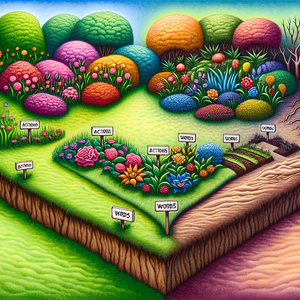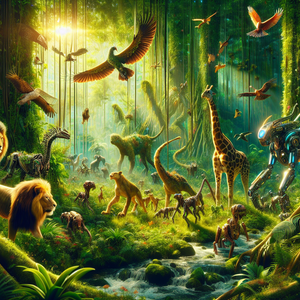The Rise of Virtual Reality in Entertainment Careers

As VR technology continues to advance, a plethora of new career paths are evolving within the entertainment sector. Some of the most prominent roles include:
VR Game Designers
VR game designers are at the forefront of creating immersive experiences that engage players in ways that traditional games cannot. Unlike conventional game development, VR requires a unique approach to gameplay mechanics and user experience. Designers must consider how users physically interact with the virtual environment and how to create intuitive controls that enhance engagement. A successful example of this is the game "Beat Saber," which combines rhythmic gameplay with an immersive VR experience that has captivated millions. The success of such games highlights the need for innovative thinkers who can push the boundaries of what gaming can achieve in a virtual space.
Immersive Experience Curators
Immersive experience curators play a pivotal role in designing and orchestrating VR experiences that transport users into entirely new worlds. From VR art installations to virtual tours of historical sites, these professionals blend storytelling, technology, and art to craft compelling narratives. The "The Night Cafe" VR experience, which allows users to step inside the famous painting by Vincent van Gogh, exemplifies how curators can transform traditional art into interactive experiences. Their work not only enhances appreciation for art and history but also encourages a deeper emotional connection between users and the content.
VR Content Creators
Content creators in the VR space focus on producing engaging multimedia that can be consumed in a virtual environment. This role requires skills in video production, 3D modeling, and animation. With platforms like Oculus and HTC Vive gaining traction, the demand for high-quality VR content is surging. For instance, the documentary "Traveling While Black" offers an interactive VR experience that explores the history of African American travel, demonstrating the power of storytelling through immersive media. Content creators are essential to the VR ecosystem, as they craft experiences that inform, entertain, and engage users in new and exciting ways.
Skills Required for Success
To thrive in the burgeoning field of VR, aspiring professionals need to develop a diverse skill set that includes: - **Technical Proficiency**: Understanding VR software and hardware is crucial. Familiarity with programming languages, game engines like Unity or Unreal Engine, and 3D modeling software can set candidates apart from the competition. As VR technology becomes more complex, technical skills will be indispensable. - **Creativity and Storytelling**: As with any role in entertainment, creativity is vital. Professionals must be able to design engaging narratives that leverage the unique capabilities of VR to enhance user experience. The ability to think outside the box and envision new worlds will be essential in capturing the imagination of audiences. - **Collaboration and Communication**: Many VR projects require teamwork across various disciplines, including designers, developers, and artists. Effective communication skills are essential to ensure that all team members work towards a common vision. The collaborative nature of VR projects means that professionals must be adept at sharing ideas and feedback.
The Future of VR in Entertainment
The potential for VR in the entertainment industry is vast and still largely untapped. As technology continues to improve, we can expect to see even more innovative applications of VR across various entertainment mediums. From virtual concerts that allow fans to experience live performances from the comfort of their homes to immersive storytelling in films, VR is poised to change how audiences engage with content. Moreover, as the industry evolves, there will be an increasing need for professionals who can navigate the ethical considerations of VR, such as user safety, privacy, and the impact of immersive experiences on mental health. Addressing these issues will be crucial for the responsible growth of VR in entertainment. The conversations around ethical VR practices will shape the future landscape of the industry, ensuring that immersive experiences are enjoyable and safe for all users.
The rise of virtual reality is not just a fleeting trend; it is a transformative force that is reshaping the entertainment landscape. With new career opportunities emerging, individuals who are willing to embrace this technology and develop the necessary skills will find themselves at the forefront of an exciting and dynamic industry. As VR continues to evolve, it promises to offer immersive experiences that challenge our perceptions of storytelling, creativity, and engagement in entertainment. For those looking to carve out a niche in this burgeoning field, the journey is just beginning—and the possibilities are limitless. As we stand on the brink of this new era, the call for innovation, creativity, and ethical considerations in VR will define the future of entertainment careers.
VR Game Developer
Oculus Studios, Epic Games, independent VR startups
Core Responsibilities
Design and develop engaging virtual reality games, integrating gameplay mechanics that utilize VR capabilities.
Collaborate with artists and designers to create visually stunning and immersive environments.
Optimize game performance for various VR platforms, ensuring smooth user experiences.
Required Skills
Proficiency in programming languages such as C# or C++ and experience with game engines like Unity or Unreal Engine.
Strong understanding of VR hardware and software, along with 3D modeling and animation skills.
Familiarity with user experience principles specific to VR.
VR Experience Designer
The VOID, Dreamscape Immersive, various art and cultural institutions
Core Responsibilities
Develop immersive user experiences for various platforms, focusing on storytelling and audience engagement.
Conduct user testing and research to refine experiences based on feedback and behavior analytics.
Collaborate with artists, programmers, and content creators to ensure cohesive and interactive designs.
Required Skills
Knowledge of UX/UI design principles, especially in immersive environments.
Experience with design software like Adobe Creative Suite, along with familiarity with 3D modeling tools.
Strong creative and storytelling skills to create impactful narratives within VR.
VR Cinematographer
Film production companies, VR content studios, streaming platforms
Core Responsibilities
Capture and produce high-quality video content for virtual reality experiences, ensuring immersive storytelling techniques.
Work with directors and producers to conceptualize and visualize scenes in 360-degree formats.
Manage equipment, lighting, and sound to enhance the overall quality of VR projects.
Required Skills
Proficiency in VR filming techniques and equipment, such as 360-degree cameras.
Strong understanding of visual storytelling, composition, and editing for VR media.
Experience with post-production software like Adobe Premiere Pro and After Effects.
VR Marketing Specialist
Marketing agencies, VR companies, entertainment firms
Core Responsibilities
Create and implement marketing strategies for VR products and experiences, targeting specific audiences.
Develop compelling promotional content, including trailers, social media campaigns, and interactive ads.
Analyze market trends and user data to optimize marketing efforts and improve engagement.
Required Skills
Strong background in digital marketing, especially in social media and content marketing.
Experience with VR platforms and an understanding of audience behavior in immersive environments.
Proficiency in marketing analytics tools like Google Analytics or HubSpot.
VR Ethics Consultant
Tech companies, regulatory bodies, research institutions
Core Responsibilities
Advise organizations on ethical considerations related to VR experiences, including user safety and data privacy.
Conduct assessments to identify potential risks associated with immersive content and user interactions.
Develop guidelines and best practices for responsible VR usage within the entertainment industry.
Required Skills
Strong understanding of ethical frameworks and legal standards related to technology and user experience.
Excellent analytical and communication skills to effectively convey ethical considerations to stakeholders.
Experience in psychology or a related field can be beneficial for understanding user impact.


